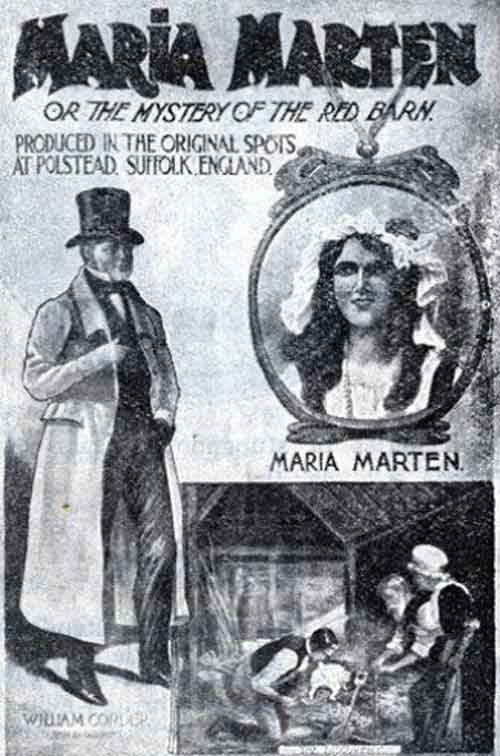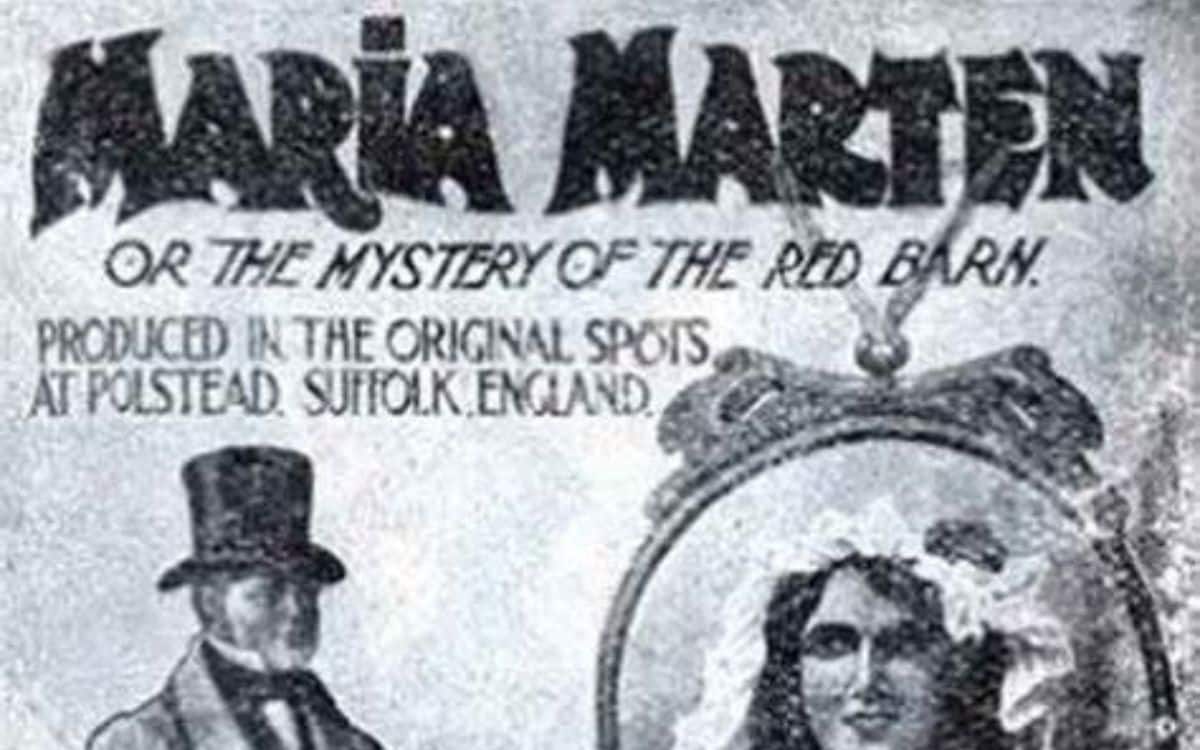RICHARD PHILLIPS-JONES laments the lost of some classic British horror films
It is probably the ambition of many British horror fans to see every genre title produced in these isles, but sadly one which is frustratingly impossible to achieve. In cinema history, many films have disappeared entirely, mainly (but not always) from the earliest years of the medium. This can be for a number of reasons, ranging from the fragility of early film materials to wilful destruction by studios or film makers. Others have simply fallen out of circulation with no clear explanation.
Naturally, there are British horror-related flicks which appear on the missing-in-action lists. In some cases, video copies do exist (see Symptoms), whilst the original film materials are believed lost. However, the five films selected here have, at the time of writing, gone well and truly A.W.O.L.
Maria Marten or The Mystery Of The Red Barn (1913)
What was known as the Red Barn Murder occurred in Polstead, Suffolk, in 1827, when Maria Marten was shot dead by her lover, William Corder (he maintained accidentally), as the two prepared to elope. A sensationalised account became a storming success on the stage for many years afterwards, and the story is probably best known today (at least, in cinematic terms) from the Tod Slaughter melodrama of 1935. However, its producer, George King, had already brought the tale to the screen in this early silent adaptation, made in the actual locations where the events took place. This was the second film by Maurice Elvey, who would become the most prolific director in British cinema history.

The First Men On The Moon (1919)
HG Wells’ tale of lunar exploration and creatures inhabiting the moon inspired a most enjoyable Ray Harryhausen project in 1964, but the Gaumont British company produced this version 45 years earlier. All that currently appears to survive is a tiny selection of stills and promotional material, along with a couple of contemporaneous reviews which indicate that the lunar sequences may not have been as impressive as the earthbound segments. However, this was the first attempt to make a faithful screen adaptation of Wells’ work, and it can also lay claim to being Britain’s first major attempt at a Sci-Fi/Horror project.
Castle Sinister (1932)
“Mad doctor tries to put girl’s brain into apeman’s head!” With a promotional blurb like that, how could anyone not want to see this? Set in a deserted castle in Devon, this was evidently an attempt to catch the wave of popularity generated by the Universal chillers, from independent film maker Widgey R. Newman. Little information on either film or director is known, but his filmography indicates a string of quickies ranging from this item to musical featurettes, comedies and even a royal documentary. Castle Sinister just might be the first British response to the Hollywood horrors arriving on our shores, and on those grounds alone would be fascinating to view today. Read more about Castle Sinister here
The Tell-Tale Heart (1953)
Produced by Adelphi Films, this 20 minute short adaptation of Edgar Allen Poe’s tale starred Stanley Baker in the lead. Since the available information seems to indicate that Baker (the sole credited cast member) was actually playing Poe himself, this begs the question: Was this one-man performance simply a recital of the original story? Baker had given a stage presentation of this nature in the same year, so it’s perfectly feasible.
The Ugly Duckling (1959)
In many ways it’s astonishing that this has disappeared – since it was made by Hammer, and distributed by Columbia Pictures, it’s something of a mystery how neither operation kept a print. This strictly-for-laughs variation on the Jekyll and Hyde story starred Bernard Bresslaw, of The Army Game/Carry On fame. Although not a critical or commercial success on its initial release, it is of considerable interest for being the studio’s first attempt at the story, as well as their first try at comedy horror.
So, are these films lost for good? Perhaps, but some lost films have turned up in the most surprising of circumstances. The missing material from the Spanish-language version of 1931’s Dracula turned up in Cuba, whilst Carl Dreyer’s The Passion Of Joan Of Arc (1928) was found in a mental institution in Oslo, so anything is possible. Whilst it’s a very long shot, if anyone out there does have one of these films sitting in their attic, the British Film Institute (and indeed, horror fans everywhere) would very much love to hear from you.
ADDENDUM: Since this article was originally published, both The Tell-Tale Heart (1953) and The Ugly Duckling (1959) have turned up – two down, three to go!




‘Tell Tale Heart’ found! See here: htpps://www.bfi.org.uk/sites/bfi.org.uk/files/downloads/bfi-press-release-lost-poe-release-bfi-player-2018-10-17.pdf
Wow!
I guess you’ve seen The Ugly Duckling is now on Talking Pictures Tv channel in the uk regularly.
It is indeed. The Tell-Tale Heart has also been rediscovered – an addendum to the article has now been added to reflect this. Thank you for pointing this out.
Not exactly a horror movie, but the featurette “Soldiers Without Uniform”, starring Tod Slaughter, Ellen Pollock, Ian Fleming and Margaret Yarde, and (perhaps) directed by Widgey R. Newman, who produced, was completed and was presented to the BBFC on Dec. 16, 1941.It got an “U”. The running time was 2.999 ft – 33mins 19secs.
After that the featurette disappeared totally. It was apparently never released. And Widgey R. Newman died in 1944. It’s NOT mentioned in the British Film Catalogue and when I contacted the late Denis Gifford many years ago he told me that this title was totally new for him ! The only mention of this featurette was in two books by David Quinlan, one about the British Studios Years 1929-1959, the other about Character Actors. I also found a notule in an American magazine which added Margaret Yarde in the cast.
Now this is a REAL mystery ! And for me, anything featuring Tod Slaughter is a treasure in itself…